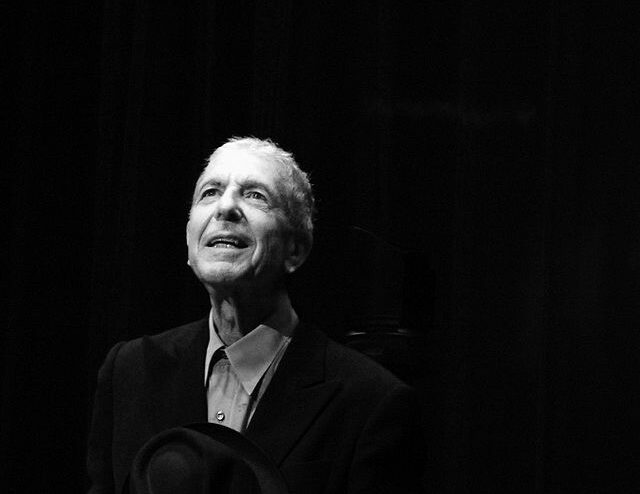
Leonard Cohen, 2008. Wikimedia Commons, Licensed under CCO 2.0.
This week, the Review is publishing a series of short reflections on love songs, broadly defined.
The other night I streamed Hallelujah: Leonard Cohen, a Journey, a Song, a documentary by Daniel Geller and Dayna Goldfine. In most of the footage, we see a Leonard who’s reflective and doubting. As I watched his Jewish man’s face age and his dark hair turn gray, I wondered what I could learn from him about drawing no conclusions. That might be the motto of his life and music—draw no conclusions. It’s a sexy, freewheeling stance. I’d like it to be the motto of my life, except I draw conclusions all the time. They happen to be wrong, which saves me.
I always wondered what women wanted from Leonard. I think they wanted what they thought the songs were about. In the songs, a man is thinking about how to get the woman, and he thinks he can get her by figuring out what she wants. Leonard is imagining what it would be like to be a woman with a man coming on to her.
This is great. This is basically the opposite of every other song written by a man about a woman. For example, in his entire life, Bob Dylan has never imagined the effect of his lyrics on a woman, or else, you know, the words would not be so sneering, and he would give us a picture of the woman and not just her effect on him. Bob doesn’t address women. He writes to men about women. He can do what he likes. But not once in my life did I think Bob would be a good fuck. Every woman on the planet has thought Leonard would be a good fuck.
There’s a clip in the documentary of Leonard singing “I’m Your Man,” the title song of an album he released in 1988. The gravel in his voice has settled. In interviews, he said he felt he could sing at that point with the “authority and intensity” the song needed. He’s trying to win back the woman. He’s screwed up in some way. Gee, I wonder how? He’s grown aloof? He’s slept around? He stands there, holding the mic like it’s her hand, and he lays himself out. He doesn’t care if he looks vulnerable. Actually, he doesn’t. He’s in control of the show. The song is the blindfold. The song is going to lead you to the party.
The music has a jaunty, Kurt Weill bounce that builds without laying on too much of the old-world schmaltz Leonard likes to play with in other songs. He’s alone, with no chorus or backup singers. Just Leonard promising anything to turn her on. The file box of possibilities, itself, is the turn-on. He’ll wear a mask for you. He’ll let you strike him down in anger. He’ll go into the ring for you. He’ll explore every inch of you. He’ll have a baby with you. He’ll drive you like a car. He’ll let you drive him like a car. He’ll move off if you want to be alone.
Let’s get back to the “I’ll explore every inch of you.” He’s been with enough women to know this is the hook. He will make you feel he could drown in you. He’s drowning in something, and in sex it’s easy to think it’s you. Until the feeling wears off.
In 2008, when Leonard is seventy-three, he hits the road again to perform. He needs to reinvent his life and he’s broke. A woman who isn’t named in the documentary has stolen all his money while he’s spent five years in a Buddhist monastery. When he plans the tour, he’s afraid of the reception he’ll get, although it turns out tons of people love him. He doesn’t know how this has happened. He doesn’t believe he has anything to say except this is the way an artist makes a life, by staying in the game. And he hopes to give pleasure.
Onstage, he tells the audience he’s grateful to perform for them. He feels honored. You think it’s authentic. He’s so sweet and also severe in his restraint. In his whole life, Bob Dylan has taken very few breaks from performing. Onstage, Bob doesn’t look at the audience or tell them more than he needs to. You want to look at me, he’s saying; well, here I am. This is what you get. With Leonard, it’s all: Take me. What is it you want that I can give you?
Laurie Stone is the author of six books, most recently Streaming Now, Postcards from the Thing that is Happening (Dottir Press), which has been long listed for the PEN America Diamonstein-Spielvogel Award for the Art of the Essay. She writes the “Streaming Now” column for Liber a Feminist Review, and she writes the Everything is Personal substack.
from The Paris Review https://ift.tt/IxXzJkM
Comments
Post a Comment